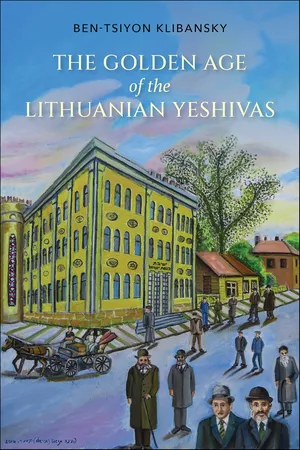
- 406 pages
- English
- ePUB (mobile friendly)
- Available on iOS & Android
The Golden Age of the Lithuanian Yeshivas
About this book
The Golden Age of the Lithuanian Yeshivas tells the story of the last chapter of Jewish rabbinical schools in Eastern Europe, from the eve of World War I to the outbreak of World War II.
The Lithuanian yeshiva established a rigorous standard for religious education in the early 1800s that persisted for over a century and continues to this day. Although dramatically reduced and forced into exile in Russia and Ukraine during World War I, the yeshivas survived the war, with yeshiva heads and older students forming the nucleus of the institutions. These scholars rehabilitated the yeshivas in their original locations and quickly returned to their regular activities. Moreover, they soon began to expand into areas now empty of yeshivas in lands occupied by Hasidic populations in Poland and even into the lands that would soon become Israel.
During the economic depression of the 1930s, students struggled for food and their leaders journeyed abroad in search for funding, but their determination and commitment to the yeshiva system continued. Despite the material difficulties that prevailed in the yeshivas, there was consistently a full occupancy of students, most of them in their twenties. Young men from all over the free world joined these yeshivas, which were considered the best training programs for the religious professions and rabbinical ordination. The outbreak of World War II and the Soviet occupation of first eastern Poland and then Lithuania marked the beginning of the end of the Yeshivas, however, and the Holocaust ensured the final destruction of the venerable institution.
The Golden Age of the Lithuanian Yeshivas is the first book-length work on the modern history of the Lithuanian yeshivas published in English. Through exhaustive historical research of every yeshiva, Ben-Tsiyon Klibansky brings to light for the first time the stories, lives, and inner workings of this long-lost world.
Frequently asked questions
- Essential is ideal for learners and professionals who enjoy exploring a wide range of subjects. Access the Essential Library with 800,000+ trusted titles and best-sellers across business, personal growth, and the humanities. Includes unlimited reading time and Standard Read Aloud voice.
- Complete: Perfect for advanced learners and researchers needing full, unrestricted access. Unlock 1.4M+ books across hundreds of subjects, including academic and specialized titles. The Complete Plan also includes advanced features like Premium Read Aloud and Research Assistant.
Please note we cannot support devices running on iOS 13 and Android 7 or earlier. Learn more about using the app.
Information
INDEX
Table of contents
- Cover
- Title Page
- Copyright
- Dedication
- Contents
- Introduction
- I. Consolidation and Expansion
- II. Aspects of the Yeshiva World
- III. The Beginning of the End
- Epilogue
- Appendix: Brief Biographies
- Glossary
- Bibliography
- Index
- About the Author